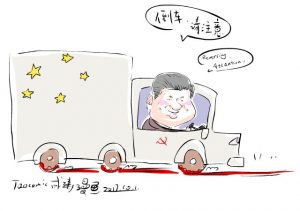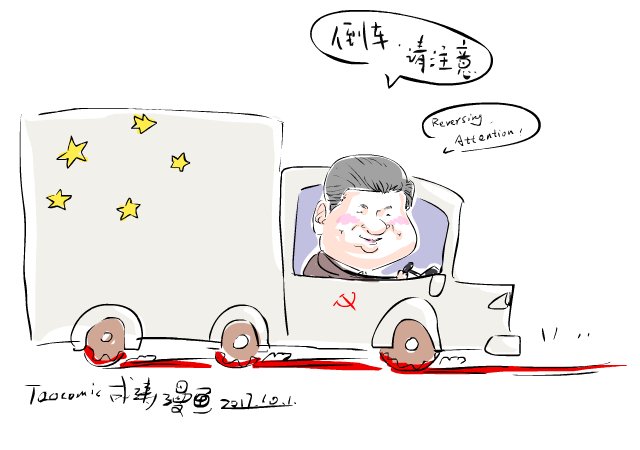The Word of the Week comes from the Grass-Mud Horse Lexicon, a glossary of terms created by Chinese netizens and encountered in online political discussions. These are the words of China’s online “resistance discourse,” used to mock and subvert the official language around censorship and political correctness.
dàochē 倒车

“Reversing, please pay attention!” (Artist: Taocomic 成涛漫画/Twitter)
To drive backwards; to turn back history. This term, along with many others, became a sensitive word in February 2018, following the announcement of a proposed constitutional amendment that, once passed the next month, removed term limits from the posts of president and vice president, opening the possibility that Xi Jinping could serve as top state leader indefinitely.
On February 25, 2018, Chinese state media published a list of proposed amendments to China’s constitution, which would be adopted the next month at the National People’s Congress session in Beijing. Among the 21 proposed amendments, one dealt with paragraph 3 of article 79, which when passed on March 11 eradicated the limit on PRC presidents and vice presidents to serve two five-year terms. Following state media’s initial February 25 release of the proposed amendments, censors kicked into overdrive to limit online discussion, and banned a long list of keywords from being searched for or posted on Weibo. Among the terms blocked, many alluded to the potential that a lack of term limits on the top state positions would have towards creating a modern day emperor. Alongside words like “my emperor” (吾皇), “ascend the throne” (登基), and “proclaim oneself emperor” (称帝), which suggested this move could turn back history to the dynastic era, other censored terms alluded to the era before the contemporary succession rules and conventions introduced by Deng Xiaoping in 1982. In addition to “drive backwards” (倒车), the blocked search term “Xi Zedong” (习泽东) suggested the amendment could shift the country back towards a system resembling Mao-era one-man rule.
Unable to comment on domestic social media about Xi’s plan to “drive back” history, Chinese web users took to Twitter, posting videos of themselves guiding cars as they backed up, and circulating cartoons of Xi calling the public to attention as he reversed a truck decorated with the hammer-and-sickle and five-star flag.
倒车请注意!一切都在真话行动中! pic.twitter.com/ryJYmXiReL
— 華湧 (@HuaYong798) February 25, 2018
https://twitter.com/apaqi3000/status/968134798408478726?tfw_site=CDTChinese&ref_src=twsrc%5Etfw&ref_url=https%3A%2F%2Fchinadigitaltimes.net%2Fchinese%2F2018%2F03%2F%25e3%2580%2590%25e4%25bc%2597%25e4%25ba%25ba%25e6%258e%25a8%25e3%2580%2591%25e5%258c%2585%25e5%25ad%2590%25e9%259c%25b2%25e4%25ba%2586%25e9%25a6%2585%2F
今天朋友圈被“倒车请注意”刷屏了。原来是修宪,删除了主席任期两届的限制。某人想登机称帝了。越来越感觉,逃离赵国是我这辈子最聪明的决定。 pic.twitter.com/P7R7FawLLA
— 成涛漫画 cartoon & comic (@taocomic) February 25, 2018
While blocked from searches in the immediate aftermath of state media’s announcement of the proposed amendment, as of April 25, 2018, Weibo allows both posts and searches for “倒车.” However, posts using the term to comment on the political situation are sparse, if not completely nonexistent.
See also Steamed Bun betrays the Constitution.








